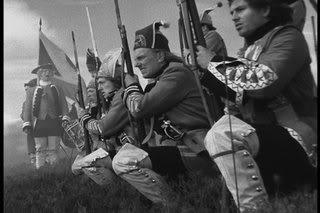 Peter Watkins spent his career redefining "docudrama." While the phrase often describes any fictionalized version of real events, Watkins' movies restage long-ago history as if filming them in real time. His first feature is Culloden (1964), which recreates Bonnie Prince Charlie's last stand in grungy, despairing detail.
Peter Watkins spent his career redefining "docudrama." While the phrase often describes any fictionalized version of real events, Watkins' movies restage long-ago history as if filming them in real time. His first feature is Culloden (1964), which recreates Bonnie Prince Charlie's last stand in grungy, despairing detail.April 16th, 1746 sees the climactic battle of Charles Edward Stuart's Jacobite Rising at Culloden. With a handful of downtrodden but fiercely loyal Highlanders, Stuart retains hope that he can defeat British forces and establish himself as King of England. Stuart is opposed by the Duke of Cumberland and his imposing force of English regulars, conscripts and Lowland Scots. Tactical mistakes and brute force deliver the English to victory, causing Stuart's dreams of a Catholic restoration to collapse.
Watkins' technique is disarmingly simple. Filming for the BBC, he uses handheld camerawork and a handful of extras to create the feel of a Frontline-style documentary. An interviewer interrogates prominent historical figures, soldiers and bystanders alike, asking their opinion on events (some responding in English, others Gaelic). An historian watches the battle through a telescope, laying out tactical details and background information, until he's swept up in the battle as well! It's simple yet devastatingly effective.
Without the budget for cast-of-thousands battles or elaborate camerawork, Watkins still impresses with forceful immediacy. The battle unfolds in a maelstrom of smoke, flying shells and shaky camerawork, resembling an 18th Century newsreel. He holds shots mostly in jarring close-up, preferring details of pock-marked, grungy faces and violent confusion to panoramas. The film's dramatic climax, a suicidal Highland charge, is shorn of any pathos or excitement, becoming instead a squalid, inglorious massacre.
Even more striking is the utterly downbeat, cynical approach to 18th Century politics, a revisionist slam on those who'd romanticize Charles. The Prince is a foppish dolt who prefers vague assurances of godly favor to tactics and strategy; his generals bicker over clannish imperatives and quartermastering responsibilities. Not that the English are any better, unleashing their men to massacre wounded soldiers and Highland civilians once the battle's won; English generals boast about their atrocities like the American officers in Hearts and Minds.
Throughout, Watkins' sardonic narration plays on ironies, contrasting the English officers' finery with their mostly-conscripted men, who don't know or care what they're fighting for. Charles' high-mindedness extends to his troops, who are fiercely loyal despite lacking food, supplies or hope of victory. Near the end Watkins veers into editorializing, blaming Charles for misleading the Scots into a hopeless fight, while decrying English punitive expeditions against the Highlanders as genocide.
Someone better-versed in Jacobite history can opine on Culloden's accuracy. Regardless, its clever approach to history seems more nakedly honest than your average period piece; even something like Battle of Algiers seems positively cinematic in comparison.

